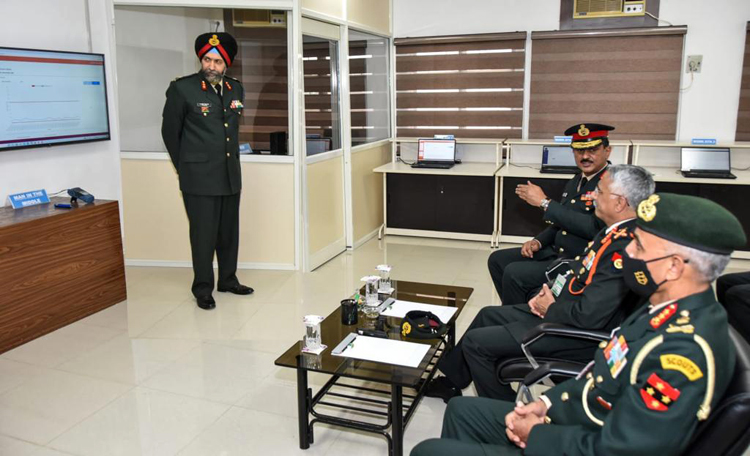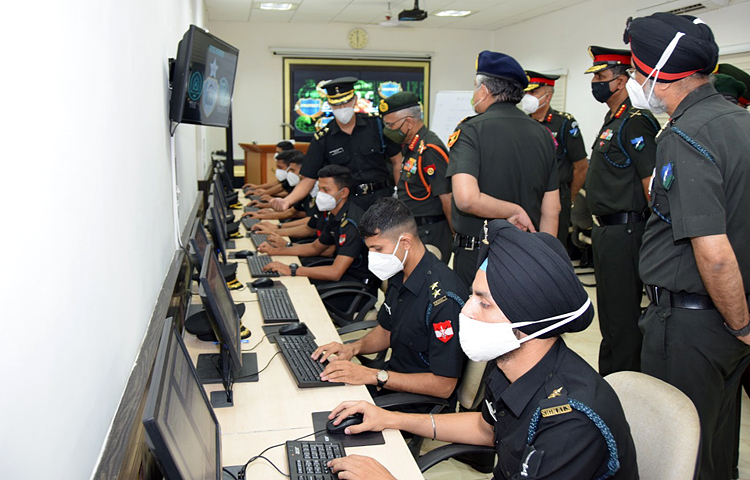INDIAN ARMED FORCES CHIEFS ON OUR RELENTLESS AND FOCUSED PUBLISHING EFFORTS

The insightful articles, inspiring narrations and analytical perspectives presented by the Editorial Team, establish an alluring connect with the reader. My compliments and best wishes to SP Guide Publications.

"Over the past 60 years, the growth of SP Guide Publications has mirrored the rising stature of Indian Navy. Its well-researched and informative magazines on Defence and Aerospace sector have served to shape an educated opinion of our military personnel, policy makers and the public alike. I wish SP's Publication team continued success, fair winds and following seas in all future endeavour!"

Since, its inception in 1964, SP Guide Publications has consistently demonstrated commitment to high-quality journalism in the aerospace and defence sectors, earning a well-deserved reputation as Asia's largest media house in this domain. I wish SP Guide Publications continued success in its pursuit of excellence.
- Operation Sindoor: Resolute yet Restrained
- India’s Operation Sindoor Sends a Clear Message to Terror and the World – ‘ZERO TOLERANCE’
- Japan and India set forth a defence cooperation consultancy framework, talks on tank and jet engines
- Terrorist Attack in Pahalgam in Kashmir: Unfolding a long surgical war against PAK
- Lt General Pratik Sharma takes over Command of Indian Army's Northern Command
Army's Quantum Lab and AI Centre
The Indian Army has recently established a Quantum Laboratory, with supports from the National Security Council Secretariat (NSCS) and an AI Centre at the Military College of Telecommunication Engineering (MCTE), Mhow in Madhya Pradesh to spearhead research and training in these key emerging fields
 |
The Author is Former Director General of Information Systems and A Special Forces Veteran, Indian Army |

Quantum technologies are emerging worldwide in the forms of quantum computing, quantum sensors, quantum simulation, quantum communications, quantum metrology, quantum imaging and the like. Quantum technologies rely on the principles of quantum physics and in the examples mentioned herein properties of quantum mechanics, quantum entanglement, quantum superposition and quantum tunneling are important.
Quantum communications are safe from quantum computing systems that could break current cryptography systems. One significant component of a quantum secure communication systems is expected to be Quantum Key Distribution (QKD) which transmits information using entangled light in a way that makes any interception of the transmission obvious to the user. Another technology in this field is the quantum random number generator used to protect data. This produces truly random numbers without following the procedure of the computing algorithms that merely imitate randomness.
Artificial intelligence (AI) is making giant strides worldwide and revolutionising the modern battlefield especially when coupled with unmanned platforms
China has developed quantum communications and has already deployed it in certain areas. In our case, news reports of March 2021 revealed that the QKD developed by the Defence Research and Development Organisation (DRDO) had undergone trials in Hyderabad between two DRDO labs, Defence Research and Development Laboratory (DRDL) and Research Centre Imarat (RCI), to demonstrate secure communications. Quantum computers are expected to have a number of important uses in computing fields such as optimisation and machine learning. They are perhaps best known for their expected ability to carry out ‘Shor’s Algorithm’, which can be used for factorisation of large numbers and is an important process in the securing of data transmissions.
America’s ‘National Quantum Initiative Act’, passed in December 2018, provides a $1 billion annual budget for quantum research. China is building the world's largest quantum research facility with a planned investment of 76 billion Yuan (about Euro 10 billion).
Concurrently, Artificial intelligence (AI) is making giant strides worldwide and revolutionising the modern battlefield especially when coupled with unmanned platforms. The AI field was founded on the assumption that human intelligence can be so precisely described that a machine can be made to simulate it. So, AI is the ability of a computer or a robot controlled by a computer to do tasks that are usually done by humans because they require human intelligence and discernment. AI powers the ability of a computer programme or a machine to think and learn. It is also a field of study which tries to make computers "smart" so that they work on their own without being encoded with commands.
Research undertaken by Indian Army in the field of Quantum Technology will help leapfrog into next generation communication
The various sub-fields of AI research are centred around particular goals and the use of particular tools. AI researchers have adapted and integrated a wide range of problem-solving techniques; including search and mathematical optimisation, formal logic, artificial neural networks, and methods based on statistics, probability, and economics. The types of AI include: Artificial Narrow Intelligence (ANI); Artificial General Intelligence (AGI) and Artificial Super Intelligence (ASI).
The Indian Army too is focused on emerging technologies. In this pursuit, the Army has recently established a Quantum Laboratory, with supports from the National Security Council Secretariat (NSCS), and an AI Centre at the Military College of Telecommunication Engineering (MCTE), Mhow in Madhya Pradesh to spearhead research and training in these key emerging fields. General M.M. Naravane, the Chief of Army Staff was briefed on these when he visited these facilities during December 2021.

The AI Centre with over 140 deployments in forward areas has active support of the industry and academia. Training on cyber warfare is being imparted through a state of the art cyber range, and cyber security labarotaries. Ideation for Army’s involvement in Electromagnetic Spectrum (EM) Operations was done in a seminar on Electromagnetic Spectrum and National Security organised in October 2020. Since then, an impetus has been given to Indian Army’s Technology Institutions for investing in AI, Quantum and Cyber.
Requisite timeline based, objectives with adequate funding have been worked out for projects and progressive fielding of solutions in Indian Army are expected on a fast track basis
A statement issued by the Ministry of Defence (MoD) has said that the research undertaken by Indian Army in the field of Quantum Technology will help leapfrog into next generation communication and transform the current system of cryptography in the Indian Armed Forces to Post Quantum Cryptography (PQC). Key thrust areas of the research are Quantum Key Distribution, Quantum Communication, Quantum Computing and Post Quantum Cryptography.
Undertaking a multi-stakeholder approach incorporating academia (like IITs), DRDO organisations, research institutes, corporate firms, startups and Industry players, this initiative is an apt example of civil-military fusion and an impetus to Atmanirbhar Bharat. Requisite timeline based objectives with adequate funding have been worked out for projects and progressive fielding of solutions in Indian Army are expected on a fast track basis.These are good initiatives that will enhance the capabilities of the Indian Army in combating our adversaries in the 21st Century battlefields.





